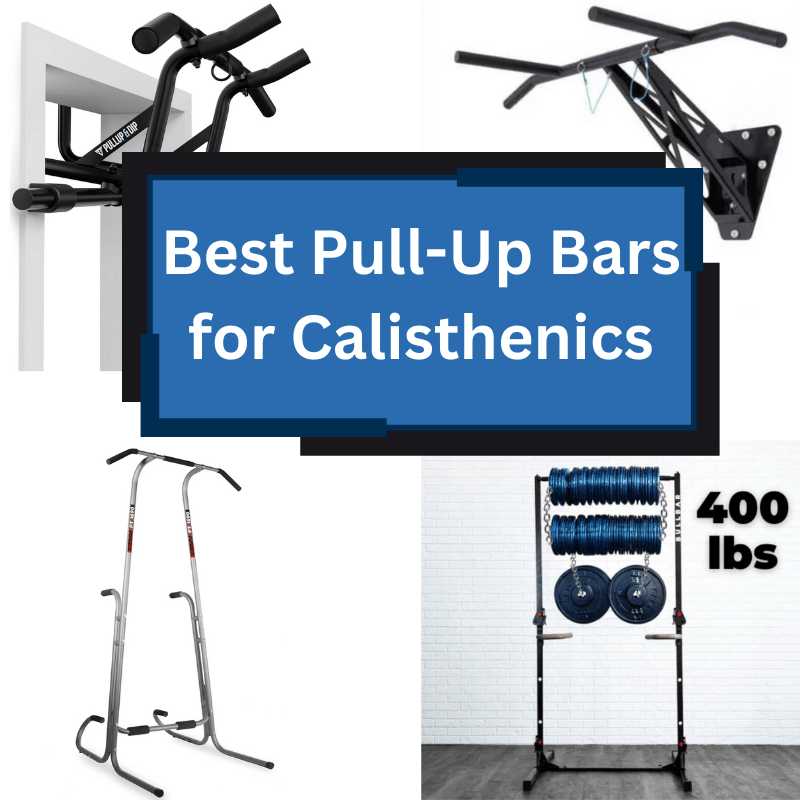A complete guide on how to choose the best pull-up bars for a home gym
Pull up bars are probably the second most important piece of calisthenics equipment, right after the gymnastics rings. Despite the super simple construction, they come in different shapes and sizes. The good thing about this is the fact that everyone can find the best bar for their needs, the downside is that it takes some effort to filter through the noise. Frankly, there is a lot of low-quality trash on the market that is best avoided.
If you are new to bodyweight training you may want to check out my intro post about calisthenics.
Since I started calisthenics, over 15 years ago, I probably have come across all the possible variations of different pull-up bars. In this article, I’d like to help you by saving you the trouble of buying multiple sets of useless equipment that will either break too soon or will not be suitable for the type of workout you want to do.
Which is the best indoor pull-up bar?
Now that we covered the outdoor bars we can move back into the house. To answer the question of which indoor pull up bar is the best we need to consider a few factors:
- Do you want to drill a hole into your wall or ceiling?
- How much space do you have at home?
- Do you want to be able to pack it away when not in use?
The doorframe pull-up bar is the ideal starter option
It is a practical option if someone has very little room at home and who doesn’t want to drill a hole in the wall for a more permanent setup. Doorway pull-up bars usually come with a foam or plastic grip which I wouldn’t recommend for calisthenics. They are most often the cheapest which comes at the expense of the build quality - if you select this option please make sure they are sturdy enough to handle your weight. They also might damage your door frame.
As you can probably tell, they are my least favorite but regardless, they still have their place in a home workout - meaning it’s better than nothing.
There are basically two versions of doorway pull-up bars:
- Outside the doorframe
- Inside the doorframe (not recommended)
If you want the best option for your doorway you can stop searching and just get the ROGUE Jammer (see below). It offers the most stable and secure way to do pull-ups in a doorway and can even handle weighted calisthenics. It is a permanent setup as you have to bolt it to the wall.
Rogue Jammer Pull-Up Bar
![Best Pull-Up Bars for Calisthenics [2025] 1 rogue jammer doorway pull up bar](https://calisthenics.com/wp-content/uploads/2023/02/rogue-jammer-doorway-pull-up-bar.png)
- Sturdiest doorway pull-up bar on the market
- 43 inch (109cm) length
- Multiple colors and coating options available
If you don't want a permanent setup or can't drill into the wall then the best portable option is a pull-up bar that hooks onto the doorframe from the outside. It gives you a higher grip which is better for taller people as it enables a full range of motion without the knees bumping into the floor. I have thoroughly tested the one from PULLUP&DIP (see below) and it does the job surprisingly well. Just make sure you double-check if your door is compatible with it.
High Doorframe Pull-Up Bar
![Best Pull-Up Bars for Calisthenics [2025] 2 pullupdip multigrip high doorframe pullup bar](https://calisthenics.com/wp-content/uploads/2024/10/pullupdip-multigrip-high-doorframe-pullup-bar.png)
*alternative buying options:
👉 GORNATION use code CS10 for 10% off
👉 PULLUP&DIP (EU) use code CALIS10 for 10% off
- Elevated design to give more legroom
- Very stable design
- Easy to put it on-and-off
- Multigrip options with padded handles
- Attachment hook for resistance bands
Freestanding pull-up bars are great for strict movements
These are the most practical options as they are easy to assemble and move around the apartment. They offer a good enough grip height that fits perfectly into a standard room. This is ideal for performing strict pull-ups and chin-ups and this freestanding pull-up bar usually also includes a set of dip bars. On the downside, they tend to be too wobbly to allow anything else other than strict movements.
Freestanding pull-up bars are in my opinion slightly better than cheap doorway pull-up bars but if your goal is to do actual home workouts, build muscle, and learn advanced calisthenics skills, I’d look further down on this list.
Premium Pull-up & Dip Station
![Best Pull-Up Bars for Calisthenics [2025] 3 gornation premium pull up station](https://calisthenics.com/wp-content/uploads/2024/12/gornation-premium-pull-up-station.png)
*use code CS10 for 10% off
- High pull-up bar placement 226cm (89 inches)
- Approved for 200kg (440lbs) maximum load
- Squat rack and plate holder included
- Compact footprint: 117x120cm (46x47 inches)
- Perform 100+ exercises
Rogue SML-2 Monster Lite
![Best Pull-Up Bars for Calisthenics [2025] 4 rogue best squat stand for home gym](https://calisthenics.com/wp-content/uploads/2023/02/rogue-best-squat-stand-for-home-gym.png)
Available accessories:
- Rogue Dip Station
- Rogue GHD - for glutes, hamstrings, and lower back training
- Sturdiest freestanding squat stand & pull-up bar combo
- Great for athletes taller than 6 foot: hight is 90 inch (228cm)
- Excellent high quality add-on accessories
- 1000 lbs (453kg) weight capacity
CAP Power Rack
![Best Pull-Up Bars for Calisthenics [2025] 5 power rack calisthenics](https://calisthenics.com/wp-content/uploads/2024/08/power-rack-calisthenics-800.png)
- 85 in (216cm) height is one of the highest on the market
- 300lbs (136kg) weight capacity
- Comes with a barbell rack: do squats at home
- Dip bar attachment available
- Multigrip pull-up bar attachment available
- Weight plate holder included: make it more stable with weights
Wall-mounted pull-up bars are the best and most functional option
If your landlord or family allows you to mount a pull-up bar on the wall, this might be the version for you. Wall-mounted pull-up bars are the best option for doing serious home workouts as they are sturdy enough to handle large weights and dynamic exercises, offer a secure grip, and don’t take up too much room. There are three main versions that I would recommend choosing from:
- pull-up bar mounted on top of the doorway
- portable pull-up bar that hooks onto the doorframe
- long multi-grip wall-mounted pull-up bars
![Best Pull-Up Bars for Calisthenics [2025] 6 rogue wall mounted pull up bar](https://calisthenics.com/wp-content/uploads/2023/02/rogue-wall-mounted-pull-up-bar.png)
*alternative buying options:
- ROGUE P-4 if your ceiling is higher than 9’6” (290cm)
- Amazon.com different item with similar specs
- The best wall mounted pull-up system on the market
- 52 inch (132cm) wide
- Over 500 lbs (226kg) weight capacity
- Enough distance from the wall for advanced calisthenics exercises
Ceiling mounted pull-up bar is just as good as the wall-mounted version
I included them here as the sub-category of wall-mounted pull-up bars. As the name suggests, the ceiling mounted pull up bars are fixed to the ceiling, they can also handle heavy weights and dynamic compound movements, their smooth metal finish offers a secure grip and they are a great option if there is no room to mount anything on the wall. Also, make sure that there is enough room between the ceiling and the bar if you want to train bar dips and muscle-ups.
![Best Pull-Up Bars for Calisthenics [2025] 7 best ceiling mounted pull up bar](https://calisthenics.com/wp-content/uploads/2023/02/best-ceiling-mounted-pull-up-bar.png)
Rogue P-5V Garage Pull-Up System
![Best Pull-Up Bars for Calisthenics [2025] 8 rogue ceiling mounted pull up bar](https://calisthenics.com/wp-content/uploads/2023/02/rogue-ceiling-mounted-pull-up-bar.png)
*alternative buying options:
- Amazon has similar specs but from a different manufacturer
- Sturdiest ceiling mounted pull-up bar on the market
- 52 inch (132cm) wide
- Customizable mounting options for the pull-up bar (closer or further from ceiling)
- Versatile: can be mounted on both the wall or ceiling
How to make a do-it-yourself garage pull-up bar
Even though wall mounted or ceiling mounted pull up bars are fairly inexpensive but if you feel like creating something on your own here is a video guide on how to build pull up bar that you can mount on the ceiling of your garage. Hope you find it helpful.
Squat rack is the best option if you want the complete home gym package
My all-time favorite indoor option is the power rack or squat rack which also includes a pull up bar. The squat rack is the best pull up bar for the home gym of someone who can afford to have the best setup without compromises. With a set like this, you will be able to train your whole body - no excuse to skip leg day anymore. As an accessory, I’d recommend getting an Olympic-size barbell, a set of weight plates, a couple of J-hooks, a dip bar add-on, and possibly even a bench. Once you have this setup, you will not miss your gym anymore. On the downside, unfortunately, these are the most expensive and also require a lot of space.
Rogue RML-390F Flat Foot Monster Lite
![Best Pull-Up Bars for Calisthenics [2025] 9 best rogue power rack](https://calisthenics.com/wp-content/uploads/2023/02/best-rogue-power-rack.png)
Available accessories:
- Rogue Dip Station
- Rogue GHD - for glutes, hamstrings, and lower back training
- Stable 48'x49' (122cm x 124cm) footprint
- No need to bolt it to the floor - easier to move around
- Great for athletes taller than 6 foot: hight is 90 inch (228cm)
- Excellent high quality add-on accessories
Outdoor pull up bar is the best for versatility
Your options will depend on whether you live in a house with a garden or an apartment. People with a dedicated fitness room or garage gym have more freedom in choosing their equipment. While others who live in a small apartments have to make more compromises.
If you want to be able to do a dead hang with extended legs and a full muscle-up on the same pull up bar, you have to consider the ceiling height of your home. Unfortunately, standard apartments don’t come with enough height for this - not for me anyway, I’m 6’2” (188cm). For this reason, if you have the means, I would urge you to consider setting up your home gym outside. I personally prefer to train outside all year round. I have a fully equipped public calisthenics park next to my house, a luxury not everyone has access to.
If you decide to build a pull up bar in your garden make sure you pay attention to a solid foundation for the feet in order to avoid any wobble. Since it will be exposed to the elements constantly it also has to be made of rust-proof material or have an appropriate coating. To expand the versatility I’d recommend choosing a pull-up bar that also includes a set of parallel bars. This way you expand the exercise options tremendously.
The best outdoor pull-up bar is high enough and includes a set of parallel bars
In my opinion, the best overall outdoor pull up bar is something like this workout station from a German company called Tolymp (see pictures). The outdoor pull up bar is a calisthenics equipment that I can recommend for anyone. There are also other manufacturers offering similar garden gyms. I’m sure you can find one who will deliver to your country.
Do it yourself outdoor pull up bar is a great budget option for the handy athlete
The downside of the previously shown pull up bars is their premium price. If you’ve got the talent you can also build a pull-up bar yourself. I’ve included some instruction videos below that can help you with the process.
How to make a pull-up bar outdoors
What exercises can I do on a pull up bar?
Well, the list is quite long but let’s try to at least name a few. The exercises you can do on a pull-up bar can be categorized into pull exercises, push exercises, static or isometric exercises, and dynamic compound exercises.
- Pull exercises: standard pull up, wide grip pull up, neutral grip pull up, narrow grip pull up, and other pull up variations like archer pull up, one-arm pull up, or typewriter pull up
- Push exercises: straight bar dip and handstand push up
- Isometric exercises: planche, front-lever, back-lever, free handstand hold
- Compound exercises: muscle-up
What is the best diameter for a pull up bar?
There are two common diameters for pull-up bars:
- Standard 1.25″ or 3.175 cm
- Fat grip: 2” or 5.1 cm
Whether to choose the standard size or the fat grip really depends on what you want to train. The benefit of the fat grip bar is that you will engage your forearm more and increase your grip strength over time. The downside is that since your forearm is a small muscle it will fatigue sooner than bigger muscle groups. This means that your arms will give in before you can actually challenge your back muscles. Nevertheless, I would still recommend adding fat bar training to your workout routine as an accessory exercise.
For most athletes, the best diameter for a pull up bar is the standard size 1.25” (3.2cm) version. It is the most versatile and suitable for all calisthenics exercises. If you want to target your forearms and grip strength you can always slide a FatGripz on your standard-size pull-up bar.
What is the best grip surface for a pull up bar?
The most common grip surfaces for pull-up bars are:
- Plastic
- Foam
- Knurled metal finish
- Smooth metal finish
The cheap doorway pull up bars usually come with plastic or foam grips. The benefit of these is that they provide a secure grip and are comfortable for the hands. This is great if you are a beginner and mostly want to do strict movements. As you advance in your calisthenics journey you will progress toward more challenging exercises. Especially the dynamic exercises will require your hands to shift position, which is difficult on foam and plastic grips. If you want to use chalk I’d avoid them as well.
For serious athletes, the only viable option is a metal pull-up bar. They usually come in knurled or smooth versions. For strict movements the knurled is fine, but as soon as you start training seriously you will find that they are not ideal for calisthenics and will grind down your skin too fast. The best grip surface for pull up bars in calisthenics is a smooth metal finish with a coating that enables a secure grip. This is an ideal option for all calisthenics exercises. For added grip, I’d recommend using chalk. For outdoor winter training, you will be forgiven to use some gloves as well.




